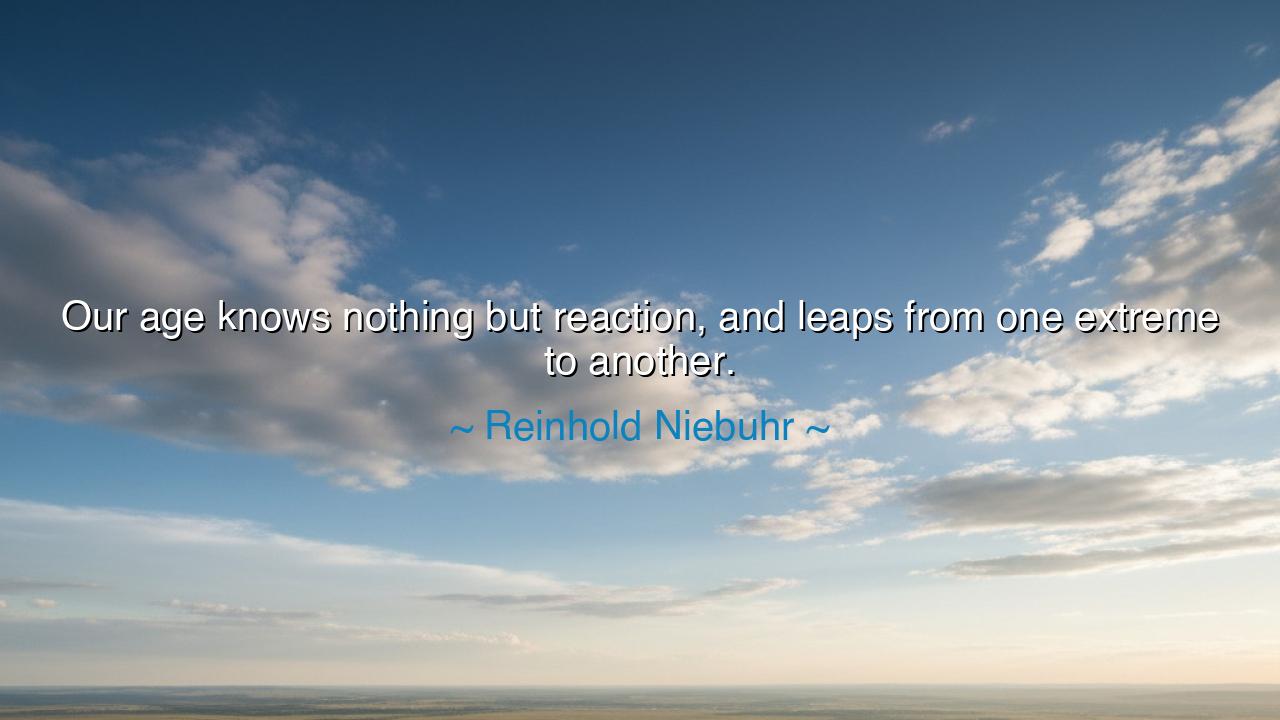
Our age knows nothing but reaction, and leaps from one extreme to






In the timeless arena of human history, there are moments when the ebb and flow of change seem to govern not only the actions of nations, but the very hearts of individuals. The profound words of Reinhold Niebuhr—“Our age knows nothing but reaction, and leaps from one extreme to another”—speak with the clarity of a prophet, capturing the essence of a world caught in the storm of its own pendulum swing. For in these words, Niebuhr speaks not just of his own time but of a universal truth, one that stretches across ages, where humanity, driven by emotions and short-sighted impulses, is bound to move from one extreme to another, never finding the balance that would bring peace to the soul.
What, then, does Niebuhr mean by the word “reaction”? In every age, there are those who rise up in opposition to what they perceive as injustice, oppression, or tyranny. But rather than standing firm in wisdom or seeking a middle ground, we often find ourselves reacting not with thought, but with emotion, lurching from one extreme to the other in a bid for change. In one moment, we may rally for freedom, only to abandon it for the false promise of security. In another, we may cry out for equality, only to fall prey to the very injustices we once decried. The result is a world that is marked not by steady progress, but by the wild and erratic swings of an unbridled pendulum.
The ancient Greeks understood this very well. In their democracies, in their philosophies, and in the shifting tides of their political life, they often fell into the same trap. Athens, for instance, in the height of its power, was marked by the extreme arrogance of its leaders, such as Pericles, who, in their thirst for dominance, pushed the city into wars it could not sustain. Then, in the wake of those wars, came the sharp reaction—a period of retreat and self-doubt that swept over the city like a bitter wind. The people of Athens, unable to maintain any steady course, bounced from one extreme to the other, and in doing so, weakened the very foundation of their great civilization.
Let us turn to a more recent example—the French Revolution. The people, in their righteous anger, rose up against the oppressive reign of the monarchy, seeking freedom and equality. But in their reaction, they did not temper their rage with wisdom; instead, they swung the pendulum so far that it landed in the hands of Robespierre and the Reign of Terror, where the blood of their own countrymen stained the streets. The revolutionaries, having seen the excesses of the monarchy, could not resist the call of extremes, and in their attempts to create a better world, they found themselves lost in the very chaos they had once opposed. The lesson here is clear: reaction—when driven by unchecked emotion—can quickly spiral into its own destructive force, carrying with it not justice, but further ruin.
In the Roman Empire, we saw similar cycles. When Julius Caesar rose to power, he did so as a reaction to the chaos and corruption within the republic. The old ways were failing, and the people turned to Caesar for hope. Yet, in their desire for stability, they handed him power, and in doing so, swung the empire into the extreme of autocracy. The empire prospered in the short term, but the seeds of tyranny were planted, and soon the republic was nothing but a shadow. Later, the emperors themselves became increasingly paranoid, always reacting to the fears of rebellion and instability, leading the empire into further extremes, until it fell under its own weight.
Thus, the words of Niebuhr ring through time as a cautionary tale. In the face of conflict, in the wake of discontent, it is not enough to simply react—to lurch from one extreme to another. We must learn to reflect, to seek balance, to understand the middle path that avoids both the tyrannies of excess and the paralysis of inaction. The greatness of a civilization, of a people, lies not in the fervor of its reactions, but in the strength of its resolve to find harmony, to measure its actions with wisdom and foresight, and to act with steadfastness in the face of change.
So, what can we learn from Niebuhr's words? The lesson is clear: in this world of ceaseless change, we must not fall prey to the endless cycle of extremes. We must resist the temptation to react hastily, without thought or understanding. Instead, let us cultivate patience, wisdom, and balance in our hearts. Let us be slow to anger and quick to understand. Let us strive not for the victories of extreme reactions, but for the enduring power of steady, thoughtful action that seeks not to tear down, but to build. If we do so, we will break free from the endless swings of extremes, and perhaps, just perhaps, we will find a peace that endures.






AAdministratorAdministrator
Welcome, honored guests. Please leave a comment, we will respond soon